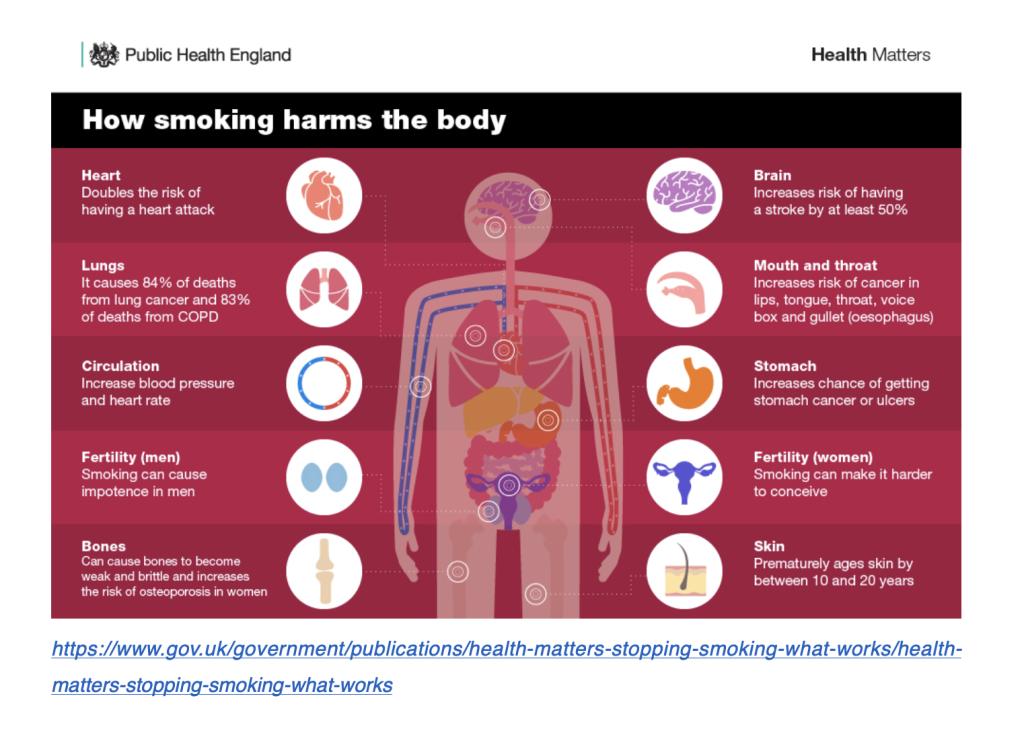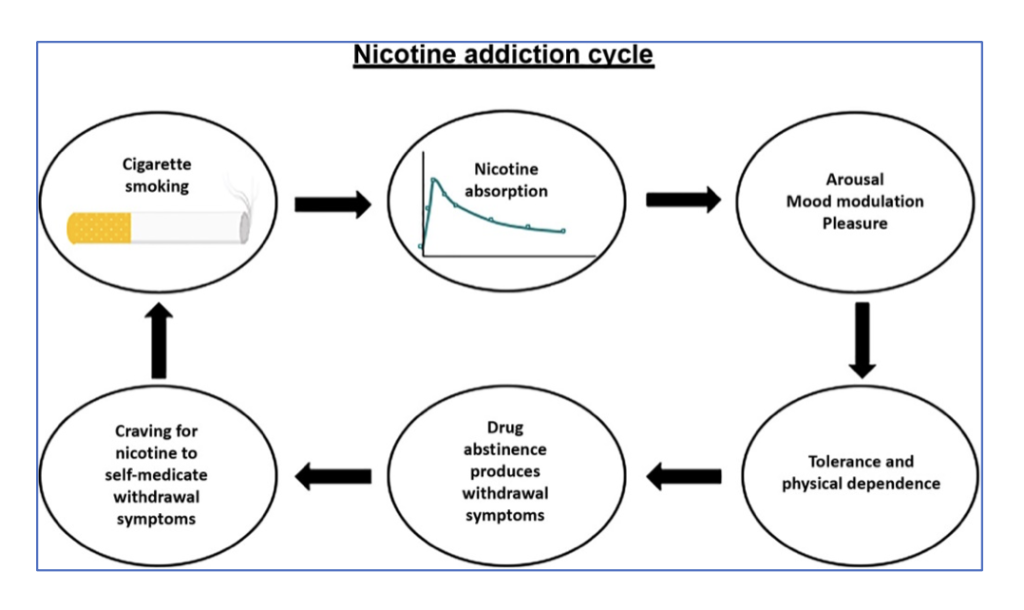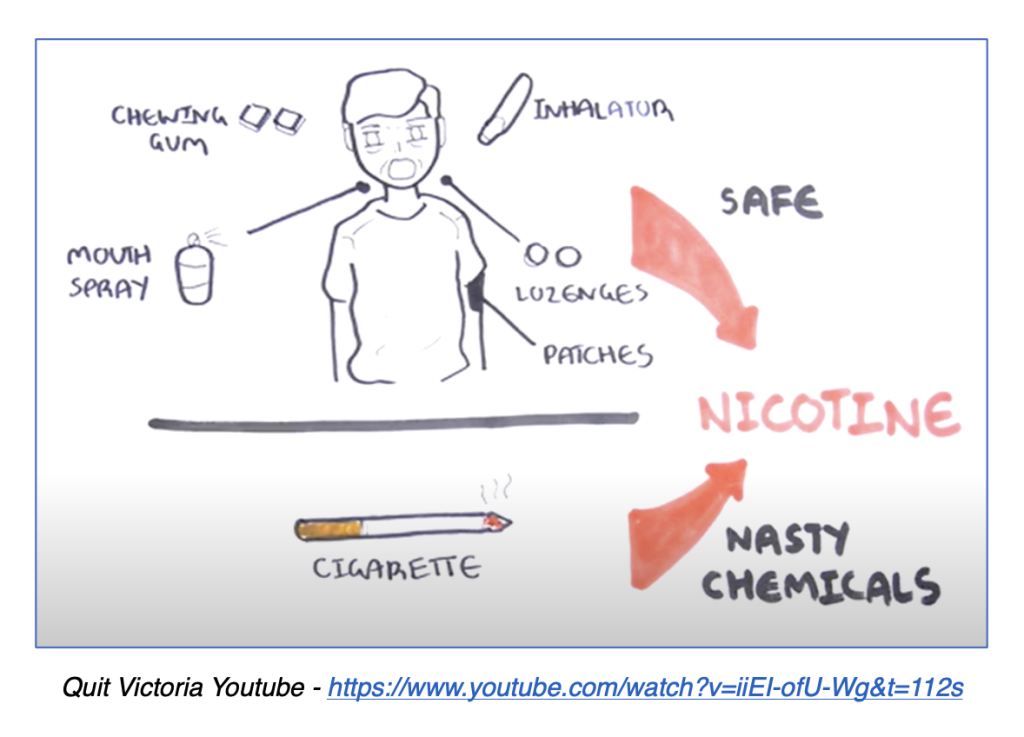Many of us have smoked, or still do for various reasons. Some of us enjoy smoking and others feel trapped. Cigarettes and smoking have lingered around the iconography of live music since the 1950s. For some of us there might be a subconscious desire — at least to begin with — to emulate our heroes, musical icons or peers. Whether it’s the cool factor, small acts of rebellion, a nicotine rush or a hard to shake addiction, there’s a lot to unpack.
As a doctor advocating for whole body health, the evidence is clear: smoking is the biggest cause of preventable illness and premature death. In the UK alone around 79,000 people die each year due to smoking. Put into context, that’s about the attendance of five sold-out arenas dying from smoking every year.
Apart from early deaths, smoking causes suffering through its impact on the body, as summarised in this diagram:

Why is it hard to quit?
When we smoke, inhaled nicotine is absorbed into our circulation where it is distributed around the body rapidly. This is where it meets nicotinic acetylcholine receptors in our central and peripheral nervous systems.
Once nicotine hits the nicotine specific receptors, neurones send impulses to the reward centre of our brain (mesolimbic pathway) which results in the release of dopamine. This leads to the experiences of increased arousal (alertness), pleasure and enhanced mood.
Over time our nervous system becomes tolerant to the amount of nicotine it is exposed to, but as the brain and nervous system become used to it we become dependent and this results in withdrawal symptoms of anxiety, restlessness, irritability, sleep disturbance and gut symptoms. These symptoms and feelings drive the urge to smoke again.
Apart from addictive nicotine, cigarettes also release several other carcinogenic substances during smoking adding to our oxidative stress.

I smoke – what can I do?
If you were only going to change one thing to improve your health, it would be to try and stop smoking. For anyone thinking of stopping smoking here is a checklist of things to think of and options to explore.
| “Stop Smoking checklist” |
| 1. Do I really want to quit? What are my reasons? (Write it down!) |
| 2. Is the timing right? Is this realistic now? |
| 3. Do I want to tell my family or colleagues, or quit with others? |
| 4. Do I know how much I would save through not smoking? |
| 5. Do I want to use an app to keep track? |
| USA : quitSTART App |
| UK : NHS Smokefree app (tracks your progress, shows how much you’re saving, offers daily support) |
| Australia: My QuitBuddy app |
| 6. Do I know where to go for advice? |
| USA : Free online resources CDC.gov/quit and Smokefree.gov |
| UK: https://www.nhs.uk/oneyou/for-your-body/quit-smoking/ |
| Canada: Delivered by each province https://www.canada.ca/en/health-canada/services/smoking-tobacco/quit-smoking/tips-help-someone-quit-smoking/you-can-quit-smoking-we-can-help.html |
| Australia: QuitCoach.org.au |
| 7. Do I want to try counselling? |
| Yes : How do I access counselling? |
| USA – free confidential coaching through a telephone quitline (1-800-QUIT-NOW) |
| UK: free Smokefree National Helpline on 0300 123 1044 |
| Canada: 1-866-366-3667 toll-free and talk to a quit coach |
| 8. Do I want to ask doctor about whether Prescription tablets are suitable ? |
| (Varenicline or Bupropion) |
| 9. Do I want to try Nicotine Replacement Patches (NRTs)? |
| Skin patches |
| Chewing gum |
| Inhalers/mouth sprays |
| Lozenges |
| 10. Do I want to Alternative methods? Hypnotherapy or acupuncture |
| 11. E-cigarettes – do I know the advice/risks? |
| UK : accepted safter alternative to cigarettes |
| Australia : not recommended by Australian Department of Health |
Nicotine replacement therapies

The good news is our habits are open to change and as I have outlined it is possible to quit through several ways. I hope the information here is helpful for anyone contemplating quitting or currently negotiating their way through.
References
- Public Health England (NHS), 2021. [online] Available at: https://assets.publishing.service.gov.uk/government/uploads/system/uploads/attachment_data/file/630217/Towards_a_Smoke_free_Generation_-_A_Tobacco_Control_Plan_for_England_2017-2022__2_.pdf Accessed 16 February 2021

